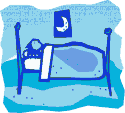Sleep Deprivation While in School

Sleep deprivation is never a good thing. It can be managed for a short time, but it can get worse and have serious impacts on your long term health. It happens often in high school, and very frequently in college and university, and the workplace. You need to take care of yourself because prolonged sleep deprivation can not only affect your academic performance in various ways, but also negatively impacts your physical and mental health.
Your academic performance suffers most if you are sleep deprived. A consistent lack of sleep results in a lack of concentration and energy; both of these are very important. Not paying attention to your teacher for important information can translate into lower grades – school work, tests or group assignments. A lack of energy can affect doing sports or even just hanging out with your friends can be a hard task.
You will need to address why you’re not sleeping well. Are you stressed about a test or the senior grades in high school required to get into the college or university of your dreams? You can get extra tutoring or extra assignments from your teacher or a classmate so your grades can improve – which means less stress on yourself. Stress can affect your health, especially at night if you are consistently worried about several things all at once, and can’t fall asleep. It can still be visually seen on your body as well – particularly bags under your eyes. If someone comments rather innocently that you look tired, try not to take offense – they just recognize a change in you from your normal self. Take it for the concern it was intended to be, and try to take steps to sleep better, not just longer.
I say sleep better, not longer, because that’s what you need to do. It’s not about the hours you sleep, but how deeply you sleep (sleep takes place in cycles). This doesn’t always happen, so don’t worry too much about it, but take the information and see what you can do with sleep phone applications or wearable technology to see what techniques or strategies you can use instead. And it’s always better to turn off the electronics well in advance before settling in for the night.
Plan accordingly, and consider strategies that help you relax and or stay asleep. Exercises such as yoga include breathing exercises that help people relax before they fall asleep. There are playlists everywhere full of calming sounds – such as birds chirping or a gentle rainfall, which can help as well. Humidifiers, dehumidifiers, air fans, or scent diffusers can also help. There are even weighted blankets that help you stay still so you can wake up feeling refreshed. There are many strategies to help you fall (or stay) asleep, it’s just a matter of finding what works best for you and your budget.
So hopefully these pieces of advice and finding the right strategy help you sleep well, as it helps with your health in multiple ways.





Laisser un commentaire!